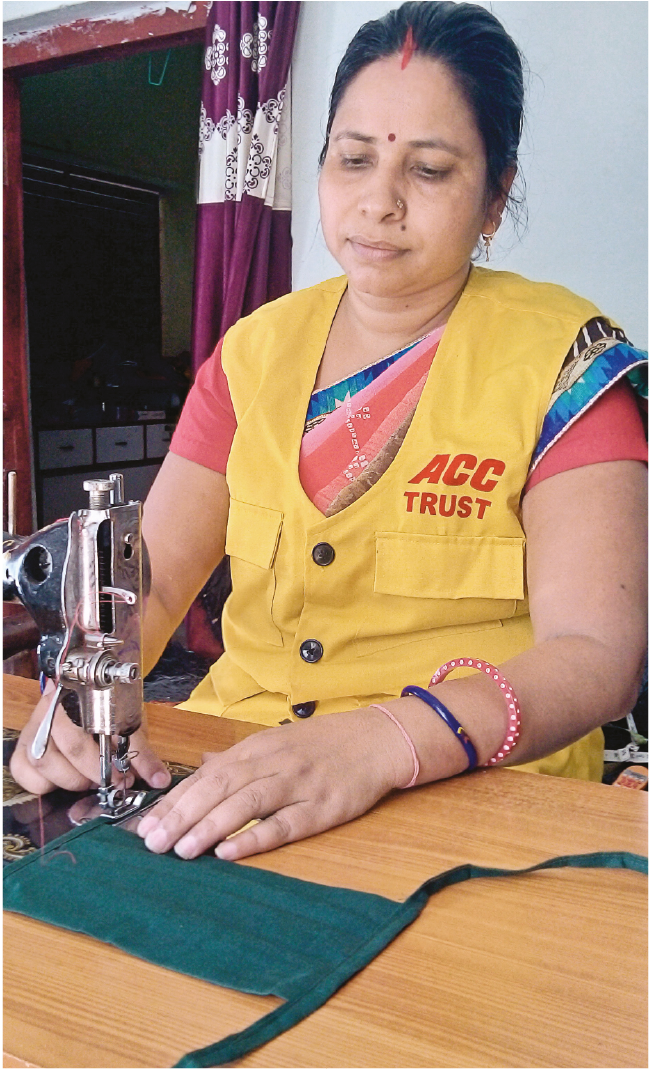Sustainability strategy
Expanding reach,
integrating sustainability
ACC was one of the earliest companies in India to have a well-defined and holistic sustainability agenda. Sustainability is at the heart of our strategy, risk management framework and core offerings. We have achieved industry leading standards for several of our sustainability and circularity initiatives like development of ‘green’ products and solutions, fossil fuel substitution, and process and logistical optimisation.

Sustainability strategy and key objectives
ACC’s sustainability strategy is built around four main pillars

CLIMATE AND ENERGY
We aim to reduce our CO2 emissions. and build a low-carbon nation.

CIRCULAR ECONOMY
We are replacing natural resources with alternative waste materials and renewable energy.

ENVIRONMENT
We strive for operational excellence to reduce our environmental footprint. This pillar primarily focuses on two aspects of water and biodiversity.

PEOPLE AND COMMUNITIES
Our rich legacy of community development and caring for our people, pathbreaking leadership and corporate empathy contributes to societal progress.
BOARD'S ROLE IN DRIVING SUSTAINABILITY
The sustainability agenda has to be driven with purpose and motivation. At ACC, a special board-level Corporate Social Responsibility (CSR) and Sustainability Committee manages our sustainability and CSR priorities, including climate action activities. It consists of four board members including the MD & CEO and is chaired by an independent director. This Committee is responsible for providing guidance in developing and overseeing climate-related strategies.
The CSR and Sustainability Committee has played a pivotal role in developing ACC's SD 2030 Plan, and in articulating the structural framework involving the four pillars. It also conducts periodic performance reviews against each of these pillars.
Further, this Committee also anchors ACC’s commitment to align with a 1.5°C Business ambition. In addition to all these responsibilities, the Committee is also tasked with providing oversight and guidance on ESG and climate-related risks, opportunities and impacts. The CSR & Sustainability Committee will be split into two separate Committees i.e. CSR Committee and Sustainability Committee with effect from January 1, 2022.
Senior leadership oversight in implementation of the sustainability targets
ACC follows a target-driven approach to the goals articulated under each pillar. The Board and the Company’s senior leadership is committed towards achievement of these goals and periodically reviews the progress against the various targets articulated under each of the four pillars, that make up the SD 2030 Plan. Based on the progress made, necessary guidance is provided.
In terms of mapping of these targets, the broader objectives are drilled down to the functional levels, with progress scorecards being reviewed on a monthly basis by the respective plant- and corporate-level functional heads. At a higher level, this progress is also reviewed during the monthly Senior Management Executive Committee (EXCO) meetings so that timely intervention can be done and the required guidance provided.
Targets-driven performance
The resolute purpose that underlies the achievement of our sustainability targets is most effectively demonstrated by the fact that ACC links its senior management and Board members performance evaluation and pay with
the meeting of these targets. Climate is the most material issue for the Company, and a significant proportion of management employees have at least one KPI linked to climate-related objectives, and it forms a part of their performance evaluation. Apart from this, there is a reward and recognition programme for all employees. Management compensation includes targets for synergy achievement including energy savings.
Global Cement and Concrete Association (GCCA)
The Global Cement and Concrete Association is an international industry association and its members
account for ∼40% of the total cement produced in
the world. Established in 2018, GCCA has a very clear sustainability agenda – to help its members reach carbon neutrality by 2050. Holcim has been a founding member of GCCA, and ACC has been part of the body since its entry into India. GCCA India’s country-level involvement began with taking over the progress made by the Cement Sustainability Initiative (CSI), under World Business Council for Sustainable Development (WBCSD). Our strategies, initiatives, actions and reporting methodologies align with GCCA charter requirements covering work on climate, water, circular economy, biodiversity, health and safety.
Our notable work with GCCA
Cement specific SDG document to capture the improved protocol.
Uniform tool for reporting alternative fuels and raw materials used and thermal substitution rate developed.
Uniform water reporting tool & water positivity calculations developed.
Advocacy for promoting blended cements in the construction sector.
Encouraging use of decarbonation technologies which includes Carbon Capture Utilisation & Sequestration (CCUS)
Collaborating with IIT Delhi to develop next-generation low carbon cement
This collaboration with the Indian Institute of Technology Delhi (IITD) aims at developing a form of calcined clay cements, a low-carbon material that will promote sustainable construction.
